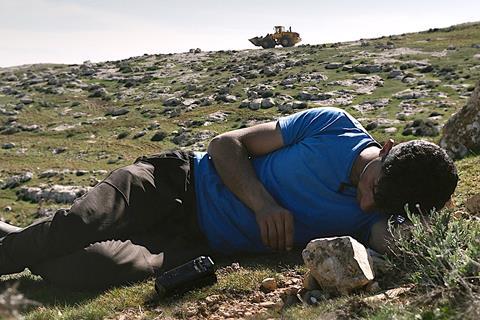
Therapy sessions and space for casual encounters made the 2024 edition of CPH:DOX an oasis of calm for the documentary community, according to international attendees.
High-profile documentary events International Documentary Festival Amsterdam (IDFA) and Thessaloniki Documentary Film Festival (TDFF) have been disrupted in recent months, with protests about Gaza at the former and an attack on a transgender couple at the latter; while 10 programmers at Canada’s Hot Docs exited the festival this weekend. The relative harmony of CPH:DOX was therefore welcomed.
“It’s super friendly – you walk up to people and start chatting, in a casual yet professional way,” said UK-based producer and former Doc Society executive Lisa Marie Russo, who consulted on Ivan Sautkin’s A Poem For Little People in the Human:Rights award strand.
“Our film is a quiet, special thing. It matches the programme and reputation of this festival,” said Sautkin of the Ukrainian title, which follows the wartime lives of both Ukrainian evacuees and two women who choose to stay.
“Attending CPH:DOX offered valuable opportunities to connect with smaller producers, stay updated on non-scripted market trends, and quickly update the production community about our company’s needs,” said Simon Antoine, London-based acquisitions manager for US production, sales and distribution company Fifth Season. “While the organised meetings were helpful, I found the informal and chance encounters in the networking spaces to be equally valuable.”
Antoine highlighted Rintu Thomas and Sushmith Ghosh’s The Dirty Dream as a standout pitch in the Forum, noting “a humourous yet insightful look into wrestling in India”; while also praising Mads Brugger’s “promising” Towards The Abyss, and Jigar Ganatra’s Tanzania-UK co-production Children Of Honey, which won the inaugural Rise and Shine award.
Thomas and Ghosh, whose previous film was 2022’s Oscar-nominated Writing With Fire, said they were so busy they arranged meetings beyond the scheduled windows into evenings.
To help attendees cope with their full schedules, the festival brought in Uortodox, a local organisation offering therapeutic sessions at business events. It co-ordinated free daily activities at the main Kunsthal Charlottenborg industry venue including plate smashing, animal therapy with dogs, rabbits and guinea pigs, and screaming into pillows.
Message of peace
Politics remained front and centre at the festival. The closing ceremony on March 22 began with a musical performance from the Middle East Peace Ensemble, a Danish group of musicians from Arabic, Jewish and Danish backgrounds. “It felt right for us to start with this basic human message of hope and peace,” said artistic director Niklas Engstrom.
Jurors for the F:Act, Next:Wave, New:Vision and Dox:Award sections then all separately called for a ceasefire in Gaza, to applause from the audience of industry attendees. “We need to keep denouncing collectively what is happening in Palestine,” said Next:Wave jurors Sofie Cato Maas, Wim Vanecker and Christian Einshoj.

Festival winners included Palestinian-Israeli documentary No Other Land, depicting the alliance between Palestinian activist Basel Adra and Israeli journalist Yuval Abraham. The duo were caught in a controversy following their anti-war acceptance speech for the documentary award at last month’s Berlinale. They were unable to attend CPH:DOX, but Adra sent a video address saying “we wish to reach the second step [with the film], which is that the world will be changed.”
At the industry awards, UK filmmaker Rachel Leah Jones won the UniFrance Doc Award for best French co-production and voiced her support for Jonathan Glazer, who had received criticism of his Oscar acceptance speech via a letter from over 450 Jewish film executives and creatives. “Let there be more Jonathan Glazers out there,” said Jones to a loud cheer from the room. “Nobody is free until everybody is free. The hostages need to be freed; the occupation needs to end; the Naqba needs to end.”
Big and small
A combination of major industry players and emerging talents marked this year’s event. Oscar winner Alex Gibney was a key speaker at the Conference programme, and gave updates to Screen on his projects about Elon Musk, George Orwell and David Chase; while Amazon hosted a dinner to celebrate the international premiere of Carla Gutierrez’s Sundance title Frida, which launched on Prime Video during the festival.
The dinner was attended by luminaries of the European documentary scene including Final Cut For Real producer Signe Byrge Sorensen, who had Manon Ouimet and Jacob Perlmutter’s Two Strangers Trying Not To Kill Each Other in the Dox:Award competition where it won a special mention.
As well as Joshua Oppenheimer’s Cannes-tipped narrative musical The End, Sorensen’s next projects include Camilla Nielsson’s Freedom, which pitched in the CPH:Forum – positioning CPH:DOX as a place for both what’s now and what’s next.
Swiss filmmaker Maja Tschumi attended the world premiere of her film Immortals at the beginning of the festival, before heading to Thessaloniki for its international launch – then returning to CPH:DOX. “I was interested in networking here,” said Tschumi. “The Conference and panels are super good – it was about how to fund a film, how to collaborate in a way that is more fair; a lot about where documentary is today.
“CPH:DOX creates an interesting form of international community,” she continued. “It’s not connected to money first, it’s connected to expression, art. You can find a lot of different people here, from lower class, upper class, from different parts of the world. We have the opportunity to talk with each other and feel this international community.”
Welcoming new voices to the film community remains an important factor for CPH:DOX. When Kinshuk Surjan’s debut Marching In The Dark received a special mention in the Human:Rights section, Sanjeevani, the Indian woman at the heart of the film, explained in a video message that not only is it the first film she has appeared in – it was the first film she had ever seen.






![The Brightest SunScreen[Courtesy HKIFF]](https://d1nslcd7m2225b.cloudfront.net/Pictures/274x183/3/5/0/1448350_thebrightestsunscreencourtesyhkiff_312678.jpg)


















No comments yet